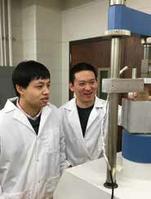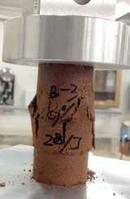The Road Taken: Summer Undergraduate Research Program Provides Two-Fold Opportunities
As the son of a Beijing man who worked in China's energy industry, Xuanchi Li, perhaps not surprisingly, chose Purdue for its international engineering reputation. Now, the junior in civil engineering is gaining research experience that could literally pay off down the road. For both the pavement and himself.
As part of Purdue’s Summer Undergraduate Research Fellowship (SURF) Program, Li worked with Antonio Bobet, professor of civil engineering, on an investigation into soils that could improve Indiana roadways. The path could also lead him to graduate school and a research career.
Through a collaboration between the Indiana Department of Transportation (INDOT) and Purdue’s Joint Transportation Research Program, Bobet examines problem soils. “Specifically we’re looking at clays that have either low plasticity or high plasticity, along with uniform sands,” he says. “These are soils found in Indiana, and particularly around the Midwest, which are part of the pavement subgrade.”
The soils become problematic, however, when they fail to support the pavement and trucking loads. Rather than swapping out the bad soil for either nonnative materials or cement-treated soils, the research team is looking at how to achieve the desired strength and stiffness of the pavement foundation through less costly treatments. Working with INDOT engineers, Bobet blends the theoretical with the practical to ascertain the best ways of improving various clays and sands from around the state.
“In the School’s Bechtel Laboratory, we’re exploring the possibilities of treating existing soil with lime or a combination of lime and cement,” Bobet says. “Lime is a byproduct that’s cheaper than cement alone.”
Li’s hands-on work, which includes running experiments and supporting the work of Fei Tao, a graduate student, provides something greater than a course’s weekly lab section. He’s even earned co-author credit on reports and publications. “This project allows me to get to know the properties of the soil very well,” says Li, whose emphasis is in geotechnical engineering. “The most exciting thing, however, is the experience I’ve gained over time.”
Indeed the SURF program is proving beneficial across two-way streets. “The undergrad research is a wonderful experience for the students, complementing the concepts they learn in class,” Bobet says. “For us, it’s a great way to recruit students to graduate school.”
With options ahead of him, Li says he’s considering both his future in geotechnical engineering and graduate school. And with a growing familiarity of the School’s Bechtel Lab, a Purdue advanced degree is definitely on that list of possibilities.

Sample soil specimens. (Photo: Kuanchi Li)


